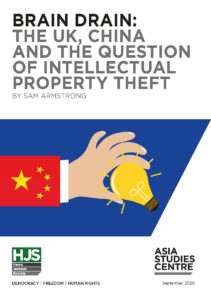 Hundreds of scientists at British universities, who would be banned from almost all postgraduate study in the US over their ties to military-linked Chinese universities, are currently researching subjects which involve knowledge useful to the creation of Weapons of Mass Destruction.
Hundreds of scientists at British universities, who would be banned from almost all postgraduate study in the US over their ties to military-linked Chinese universities, are currently researching subjects which involve knowledge useful to the creation of Weapons of Mass Destruction. The findings come in a report, published today, by the Henry Jackson Society.
It explores the number of individuals researching seven subjects considered particularly sensitive by the UK’s Academic Technology Approval Scheme. It compares open-source information about these researchers against the Australian Strategic Policy Institute’s “China Defence University Tracker“.
The report does not accuse the graduates of such Chinese universities of participating in the theft of intellectual property or other wrongdoing. However, it is the author’s opinion that common sense and US experience should surely dictate that the identified categories of graduates/students on these types of courses should be vetted far more carefully before being given access to our valuable, strategic, IP as a ‘belt and braces’ exercise at the very least.
The paper identifies a series of failings in the UK’s regulatory approach, criticising the Government over the facts that:
-
- There have been no prosecutions for offences related to IP theft at British universities in recent memory, despite the US authorities indicting 14 individuals for such crimes this year alone. Jurisdiction for such crimes is split between HMRC and UK Border Force, neither of whom describe such crimes as a priority.
- Unlike with basic visa information, applicants to study the most sensitive courses in the UK cannot be questioned face-to-face about the responses they provide to the ATAS questionnaire.
- The FCDO maintains no central database of Chinese national students researching the most dangerous courses.
- Applicants for clearance to study such courses are not asked basic questions about military ties, political affiliations, or even if they have agreed to share information with their home governments.
It recommends transferring the ATAS programme from the FCDO to the Home Office while responsibility for enforcement should be transferred to the National Crime Agency.
READ THE REPORT HERE
High-risk individuals enrolled in high-risk subjects at UK universities
| University | High-risk subject Seven Sons | High-risk subject Very High Risk | High-risk subject High Risk | High-risk subject Medium Risk | High-risk subject Low Risk | High-risk subject ASPI Total |
|---|---|---|---|---|---|---|
| University of Oxford | 16 | 38 | 44 | 16 | 2 | 100 |
| University of Cambridge | 4 | 22 | 20 | 7 | 1 | 50 |
| University of Sheffield | 16 | 24 | 16 | 8 | 1 | 49 |
| Imperial College London | 6 | 17 | 17 | 11 | 0 | 45 |
| University of Manchester | 8 | 32 | 11 | 11 | 2 | 56 |
| Loughborough University | 9 | 19 | 17 | 6 | 0 | 42 |
| Cranfield University | 9 | 17 | 12 | 3 | 1 | 33 |
| University of Bath | 4 | 8 | 5 | 2 | 0 | 15 |
| University of Warwick | 9 | 13 | 9 | 6 | 2 | 30 |
| University of Edinburgh | 5 | 15 | 9 | 6 | 0 | 30 |
| University of Birmingham | 4 | 11 | 14 | 6 | 1 | 32 |
| University College London | 3 | 8 | 13 | 8 | 0 | 29 |
| University of Liverpool | 1 | 15 | 7 | 9 | 0 | 31 |
| Aston University | 3 | 11 | 8 | 8 | 0 | 27 |
| Durham University | 4 | 11 | 7 | 8 | 0 | 26 |
| University of Southampton | 4 | 15 | 7 | 3 | 0 | 25 |
| Cardiff University | 6 | 15 | 4 | 4 | 1 | 24 |
| Queen Mary University of London | 3 | 10 | 6 | 9 | 1 | 26 |
| University of Surrey | 3 | 13 | 7 | 0 | 0 | 20 |
| University of Bristol | 9 | 10 | 6 | 3 | 0 | 19 |
| University of Nottingham | 8 | 10 | 4 | 5 | 0 | 19 |
| University of Glasgow | 3 | 9 | 5 | 2 | 0 | 16 |
| University of St Andrews | 0 | 1 | 6 | 8 | 0 | 15 |
| University of Leeds | 2 | 8 | 6 | 3 | 0 | 17 |
| Newcastle University | 2 | 2 | 7 | 3 | 0 | 12 |
| University of Exeter | 1 | 2 | 6 | 1 | 1 | 10 |
| King's College London | 2 | 3 | 4 | 3 | 0 | 10 |
| Queen's University Belfast | 3 | 4 | 4 | 2 | 0 | 10 |
| Lancaster University | 1 | 4 | 3 | 2 | 1 | 10 |
| University of York | 1 | 3 | 2 | 2 | 0 | 7 |
| University of Leicester | 1 | 2 | 4 | 1 | 0 | 7 |
| University of Aberdeen | 1 | 3 | 1 | 3 | 0 | 7 |
| Keele University | 0 | 2 | 1 | 0 | 0 | 3 |
| TOTAL | 151 | 377 | 292 | 169 | 14 | 852 |


